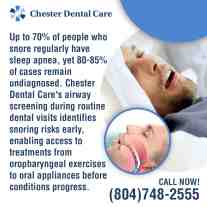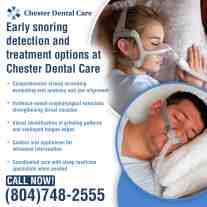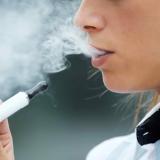Dental professionals are uniquely positioned to identify snoring risks during routine visits, often detecting airway problems years before they become severe breathing disorders. Modern dental practices use specialized screening techniques to spot anatomical features and oral signs that indicate increased snoring risk, providing early intervention opportunities when treatments for snoring remain most effective.
Snoring affects between 25% and 50% of adults regularly, according to medical experts, yet many people don't realize their dental team can identify risk factors during routine cleanings and exams.
Understanding how dental clinics screen for airway problems helps patients access early treatment options, from natural treatment for snoring to professional interventions that prevent serious complications.
Early airway screening in dental settings represents a preventive healthcare approach that addresses problems before they progress to severe sleep-disordered breathing. At Chester Dental Care, patients benefit from airway assessment integrated into routine dental care, combining general dentistry and oral health maintenance, with breathing wellness evaluation.
Key Takeaways
Dentists can spot airway risks early - Routine dental visits allow professionals to identify anatomical features and oral signs linked to snoring, giving patients access to effective snoring treatments before conditions progress into sleep apnea.
Snoring often signals deeper health issues - Up to 70% of people who snore regularly may have sleep apnea, showing why early screening and timely treatments for snoring are critical for preventing long-term health complications.
Airway screening uses simple but effective methods - Dentists at airway-focused dental clinics evaluate oral structures, neck circumference, jaw alignment, and patient history to detect snoring risks that patients may not recognize themselves.
Early detection opens more treatment options - Natural exercises, positional therapy, and at-home snoring treatments often work best when started early, while oral appliances or medical collaboration help in moderate to severe cases.
Dental airway care supports overall health - By integrating airway screening with oral health checkups, dental practices like Chester Dental Care provide patients with preventive pathways that improve sleep quality, breathing wellness, and long-term outcomes.

Understanding Snoring and Its Health Impact
Snoring occurs when airflow through relaxed throat tissues creates vibrations during sleep. This common phenomenon affects millions of adults worldwide and can range from occasional light snoring to chronic, disruptive breathing patterns that signal underlying airway problems.
While occasional snoring may seem harmless, persistent snoring often indicates partial airway obstruction that can worsen over time. The tissues involved include the soft palate, tongue base, throat muscles, and nasal passages. When these structures relax excessively during sleep, they narrow the breathing pathway and create the characteristic sounds.
Research shows that up to 70% of people who snore regularly have been diagnosed with sleep apnea, highlighting the connection between snoring and serious breathing disorders. This statistic emphasizes why early detection matters: catching snoring risks before they develop into sleep apnea provides more treatment options and better outcomes.
The progression from simple snoring to obstructive sleep apnea typically occurs gradually over years. During this development period, dental professionals can identify anatomical risk factors and recommend interventions that may prevent more severe problems from developing.
How Dental Professionals Screen for Airway Problems
Dental airway screening involves systematic evaluation of oral anatomy, breathing patterns, and sleep-related symptoms during routine appointments. This approach allows dental teams to identify patients at risk for snoring and sleep-disordered breathing before problems become severe.
Visual and Physical Examination Techniques
Dentists examine specific anatomical features that correlate with increased snoring risk. A narrow upper airway at the soft palate level, enlarged tonsils, and a large tongue relative to mouth size all contribute to breathing difficulties during sleep.
The Mallampati classification system helps dental professionals assess airway visibility. When patients open their mouths and extend their tongues, dentists can see how much of the throat is visible. A Mallampati score of 3 or 4, where only the hard palate or less is visible, indicates a higher snoring risk.
Neck circumference measurements provide additional screening data, as neck measurements over 16 inches correlate strongly with sleep apnea risk. This simple measurement takes seconds to perform but provides valuable information about airway obstruction likelihood.
Dental professionals also evaluate jaw relationships and bite patterns. A receding lower jaw positions the tongue further back in the mouth, reducing airway space during sleep. Significant overbites can also indicate increased snoring potential.
Oral Signs That Signal Airway Problems
Several oral conditions commonly appear in patients with snoring and sleep apnea. Recognizing these signs allows dental teams to initiate airway screening conversations with patients who may not realize they have breathing problems.
Bruxism, or teeth grinding, often develops as an unconscious effort to reopen blocked airways during sleep. Dental professionals can identify grinding patterns through tooth wear, jaw muscle tension, and patient reports of morning headaches or jaw soreness.
Dry mouth conditions (xerostomia) frequently affect people who breathe through their mouths during sleep due to nasal congestion or airway restrictions. Patients with chronic dry mouth, increased cavity rates, and gum irritation may benefit from airway evaluation.
A scalloped tongue with indented edges from pressing against teeth during breathing interruptions provides another clear indicator of sleep-related breathing problems. This physical evidence helps dental professionals identify patients who experience airway obstruction during sleep.
Patient History and Symptom Assessment
Airway screening includes detailed questioning about sleep quality, daytime symptoms, and partner observations. Many patients don't realize their snoring indicates a health concern until dental professionals explain the connections.
Dentists routinely ask about snoring frequency, loudness levels, and whether bed partners notice breathing interruptions. These questions often reveal information patients haven't shared with other healthcare providers, as dental visits occur more frequently than medical appointments for many people.
Fatigue, morning headaches, difficulty concentrating, and mood changes can all stem from poor sleep quality related to breathing problems. Dental professionals who recognize these patterns can recommend appropriate follow-up care. At that point, referral to a physician is necessary for a definitive diagnosis and treatment plan.
Early Detection Benefits and Treatment Pathways
Identifying snoring risks during dental visits allows for early intervention when treatments remain most effective and least invasive. Many snoring treatments at home and professional options work better when implemented before breathing problems become severe.
Early detection provides access to a wide range of treatment approaches. Simple lifestyle modifications, positional therapy, and oral exercises may effectively address mild snoring when identified early. As problems progress, more complex interventions become necessary.
Research demonstrates that oropharyngeal exercises can reduce snoring frequency when performed consistently. These approaches for natural treatment of snoring work best when started before airway obstruction becomes severe.
Conservative Treatment Options
Snoring treatment exercises offer effective intervention for many patients identified through dental screening. These exercises strengthen throat muscles, improve tongue positioning, and enhance overall airway muscle tone.
Tongue exercises involve specific movements that target the muscles responsible for maintaining airway patency during sleep. Patients can perform these exercises at home as part of snoring treatment at home programs recommended by their dental team.
Throat-strengthening exercises include vowel pronunciation drills, swallowing exercises, and specific tongue positioning techniques. Studies show that consistent practice of these exercises for 15-20 minutes daily can produce measurable improvements in snoring within weeks.
Positional therapy helps patients avoid sleeping positions that worsen snoring. Sleeping on the back allows gravity to pull throat tissues backward, narrowing the airway. Side-sleeping techniques and supportive pillows can reduce snoring severity significantly.
Professional Treatment Integration
Dental practices often coordinate care with sleep medicine specialists, ENT physicians, and other healthcare providers to address complex airway problems. This collaborative approach makes sure that patients receive treatment that addresses all contributing factors.
Oral appliance therapy represents a primary option that dental professionals can provide directly.
Treatment Approaches by Severity
Different snoring severity levels require tailored treatment approaches. Medical professionals can match appropriate interventions to individual patient needs based on screening results and symptom assessment.
Mild Snoring Management
Treatment Type |
Effectiveness |
Implementation |
Snoring Treatment Exercises |
Reduction in frequency |
Daily 15-minute routines |
Positional Therapy |
Improvement in back sleepers |
Side-sleeping aids and techniques |
Nasal Breathing Enhancement |
Variable, depends on obstruction |
Saline rinses, allergy management |
Lifestyle Modifications |
Improvement with weight loss |
Diet, exercise, alcohol reduction |
Moderate to Severe Cases
More significant snoring problems require professional intervention, often combining multiple treatment modalities for optimal results. Dental screening helps identify these cases early, when treatment options remain less invasive.
Oral appliance therapy becomes the primary recommendation for mild to moderate cases. Custom devices created by dental professionals help maintain airway patency throughout sleep.
Advanced cases may require surgical consultation or sleep studies. However, early identification through dental screening often prevents progression to severity levels requiring invasive interventions.
Technology and Modern Screening Methods
Contemporary dental practices incorporate advanced technology to enhance airway screening accuracy and patient education. Digital imaging, airway analysis software, and patient monitoring tools provide detailed assessment capabilities.
3D imaging technology allows dental professionals to visualize airway dimensions and identify restriction points that contribute to snoring. These detailed views help determine appropriate treatment approaches and monitor progress over time.
Smartphone applications for snoring detection provide patients with objective data about their breathing patterns. While these apps shouldn't replace professional evaluation, they offer valuable information that supports treatment decisions and monitors progress.
Sleep recording technology integrated with dental practices allows for assessment of breathing patterns, snoring frequency, and treatment effectiveness. This data-driven approach improves treatment outcomes and patient compliance.
Integration with Overall Health Management
Airway screening in dental settings connects oral health with systemic wellness, recognizing that breathing problems affect cardiovascular health, cognitive function, and overall quality of life. This holistic approach provides comprehensive patient care that addresses multiple health concerns simultaneously.
Dental professionals often identify airway problems before other healthcare providers because patients visit dental offices more frequently than medical offices. This positioning allows for earlier intervention and prevention of serious complications.
The connection between oral health and airway function means that maintaining healthy teeth and gums supports better breathing. Professional cleanings, gum disease treatment, and oral hygiene education all contribute to optimal airway health.
When to Seek Professional Evaluation
Certain symptoms and risk factors warrant immediate professional airway evaluation, even in patients who don't consider themselves heavy snorers. Recognizing these warning signs helps patients access appropriate care promptly.
Loud, frequent snoring combined with witnessed breathing pauses requires urgent sleep medicine evaluation. These symptoms often indicate sleep apnea that demands immediate medical attention to prevent cardiovascular complications.
Morning headaches, excessive daytime fatigue, difficulty concentrating, and mood changes may signal inadequate oxygenation during sleep. Patients experiencing these symptoms alongside snoring should receive an airway assessment.
Risk factors, including obesity, neck circumference over 16 inches, family history of sleep apnea, and certain medications, increase the likelihood of serious breathing disorders. Early screening for high-risk patients can prevent complications and improve outcomes.
For airway concerns, coordination between dental and medical professionals is key. Airway-focused practices collaborate with physicians, sleep specialists, and related providers to address underlying oral and breathing conditions.
Chester Dental Care's Thorough Approach
At Chester Dental Care, airway screening integrates seamlessly with routine dental appointments, providing patients with a complete assessment that addresses both oral health and breathing wellness. Dr. Shwetha Rodrigues and her team utilize advanced screening techniques to identify airway risks early, when options for snoring treatments remain most effective.
The practice's airway-focused approach recognizes that optimal oral health requires proper breathing function. By addressing both aspects simultaneously, patients achieve better overall outcomes and long-term wellness.
As Vivos Clinical Advocates, the Chester Dental Care team brings specialized skills in airway health assessment and treatment. This advanced training allows for precise identification of breathing problems and appropriate treatment recommendations tailored to individual patient needs.

Prevention and Long-term Management
Successful airway health requires ongoing management that combines professional care with patient self-care practices. Early detection through dental screening establishes the foundation for long-term breathing wellness and quality sleep.
Patient education about risk factors, symptom recognition, and treatment options empowers individuals to take active roles in their airway health. Understanding when to seek help and how to implement natural treatment for snoring improves outcomes significantly.
Regular follow-up appointments allow dental professionals to monitor treatment effectiveness, adjust approaches as needed, and identify any changes in airway status. This ongoing care prevents regression and maintains optimal breathing function.
Conclusion
Airway screening in dental settings provides invaluable early detection opportunities that can prevent simple snoring from progressing to serious sleep-disordered breathing. Through systematic evaluation of oral anatomy, breathing patterns, and risk factors, dental professionals identify problems when treatments for snoring remain most effective and least invasive.
Discover How Airway Screening Can Improve Your Sleep and Health
Ready to learn whether you might benefit from airway screening during your next dental visit? Chester Dental Care provides airway assessment integrated with routine dental care, identifying breathing problems when treatment options remain most effective.
Our experienced team uses advanced screening techniques to evaluate your individual airway health and snoring risk factors. As specialists in airway-focused dentistry, we can recommend appropriate treatments for snoring ranging from natural exercises to professional appliance therapy.
Call Chester Dental Care today at (804) 748-2555 or email frontdesk@chesterdentalcareva.com to schedule your airway screening and dental appointment. We serve Chester and nearby areas throughout the Greater Richmond region, helping patients achieve better breathing and optimal oral health.
Don't wait for snoring to become a serious health problem. Professional airway screening can identify risks early and provide access to effective treatments that improve your sleep, health, and quality of life.



